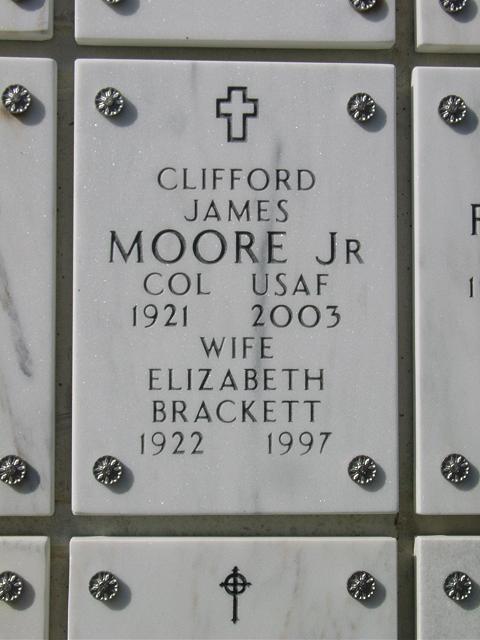From a contemporary press report:
Clifford James Moore Jr., 81, an Air Force Colonel who flew fighter and intelligence-gathering planes, served in the Strategic Air Command and retired in 1973 from the Institute for Defense Analysis, died February 17, 2003, at his home in Hillsboro. He had congestive heart failure and diabetes.
Colonel Moore was a native of Montgomery, Alabama, and a 1943 graduate of the U.S. Military Academy at West Point. He flew missions over Europe. including cover for the Normandy invasion and attacks on German supply trains and factories, during World War II.
After the war, he was executive officer for Air Force chiefs at the Pentagon, who included generals Carl Spaatz, Hoyt Vandenberg and Nathan Twining. He was also the pilot and escort officer for the U.S. Air Force Academy site-selection committee.
In the late 1950s, he commanded a group in Germany that supported U.S. intelligence operations along the Iron Curtain from northern Europe south to Turkey. Those included U-2 spy plane operations out of Wiesbaden and other intelligence-gathering aircraft. Colonel Moore piloted more than 40 types of American and foreign-built aircraft during his career.
In 1966, he was assigned to the weapons systems evaluation group at the Institute for Defense Analysis in the Washington area. He was a consultant after he retired.
His honors included the Distinguished Flying Cross, the Legion of Merit and eight Air Medals.
In retirement he moved to a Loudoun County wildlife preserve and popular fishing spot. He was an active amateur radio operator and built and flew radio-controled model airplanes. He was a member of the D.C. Radio Control Club, the Order of Daedalians and the Old Crows.
His wife, Elizabeth Brackett Moore, whom he married in 1944, died in 1997.
Survivors include two children, Tory Moore Tennaro of Brandon, Fla., and C. James Moore III, of Alexandria; and three grandchildren.
Michael Robert Patterson was born in Arlington and is the son of a former officer of the US Army. So it was no wonder that sooner or later his interests drew him to American history and especially to American military history. Many of his articles can be found on renowned portals like the New York Times, Washingtonpost or Wikipedia.
Reviewed by: Michael Howard

